Australian Engineering Practice: Skills, Collaboration, and Leadership
VerifiedAdded on 2019/11/14
|7
|1553
|385
Homework Assignment
AI Summary
This assignment is a reflective piece by an engineering student on Australian engineering practice. The student discusses the importance of collaboration, drawing from personal experiences in a group project and as a team leader, highlighting the development of communication and leadership skills. The assignment also identifies key competencies for success, including analytical thinking, change leadership, and organizational awareness, while acknowledging areas for improvement. Furthermore, the student evaluates their time management skills, identifying strengths in goal setting, prioritization, and avoiding distractions, but also weaknesses in procrastination and multitasking. Finally, the student expresses aspirations to work for top manufacturing companies and outlines the essential technical and soft skills needed for a successful career in engineering, supported by relevant references.
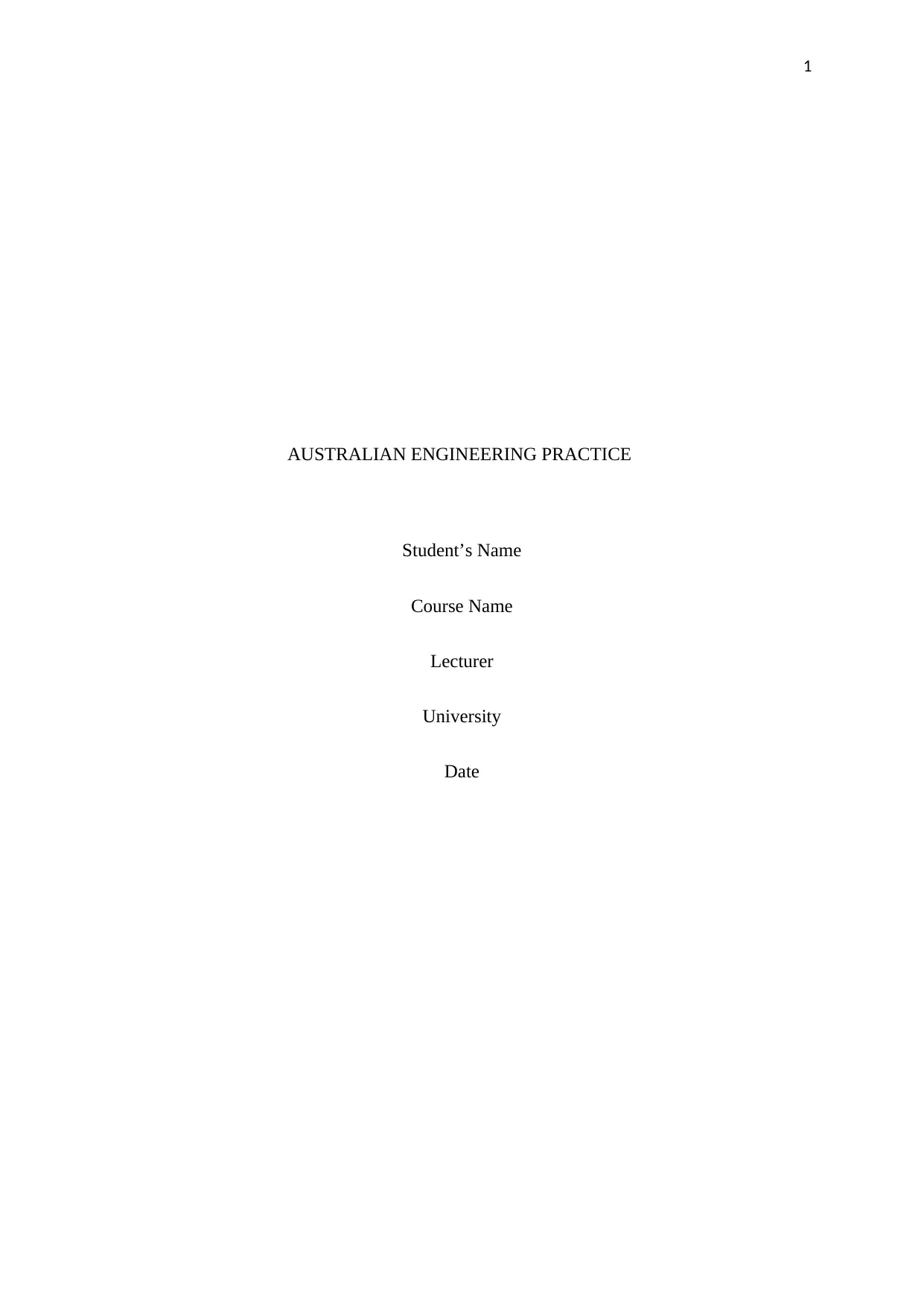
1
AUSTRALIAN ENGINEERING PRACTICE
Student’s Name
Course Name
Lecturer
University
Date
AUSTRALIAN ENGINEERING PRACTICE
Student’s Name
Course Name
Lecturer
University
Date
Paraphrase This Document
Need a fresh take? Get an instant paraphrase of this document with our AI Paraphraser
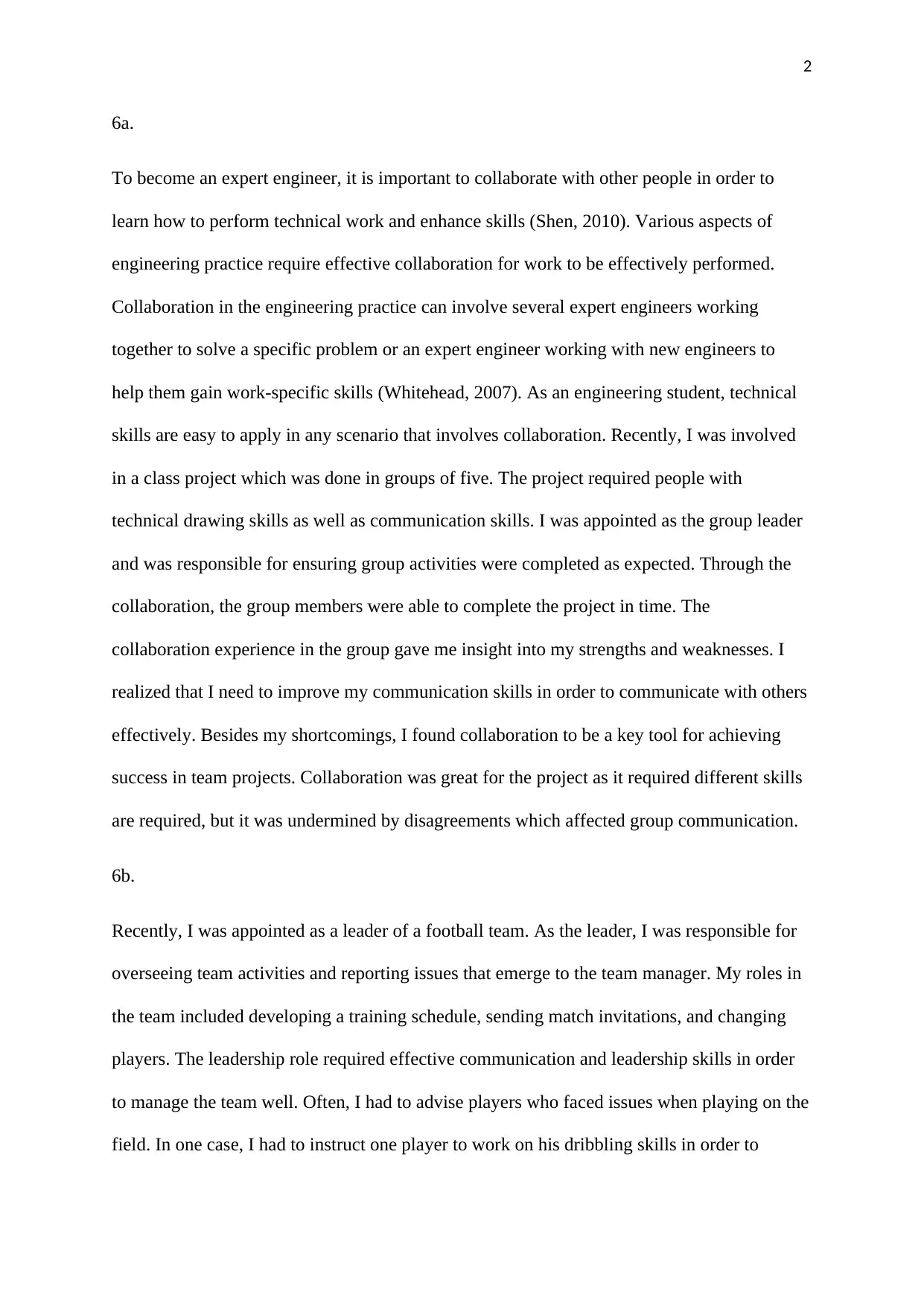
2
6a.
To become an expert engineer, it is important to collaborate with other people in order to
learn how to perform technical work and enhance skills (Shen, 2010). Various aspects of
engineering practice require effective collaboration for work to be effectively performed.
Collaboration in the engineering practice can involve several expert engineers working
together to solve a specific problem or an expert engineer working with new engineers to
help them gain work-specific skills (Whitehead, 2007). As an engineering student, technical
skills are easy to apply in any scenario that involves collaboration. Recently, I was involved
in a class project which was done in groups of five. The project required people with
technical drawing skills as well as communication skills. I was appointed as the group leader
and was responsible for ensuring group activities were completed as expected. Through the
collaboration, the group members were able to complete the project in time. The
collaboration experience in the group gave me insight into my strengths and weaknesses. I
realized that I need to improve my communication skills in order to communicate with others
effectively. Besides my shortcomings, I found collaboration to be a key tool for achieving
success in team projects. Collaboration was great for the project as it required different skills
are required, but it was undermined by disagreements which affected group communication.
6b.
Recently, I was appointed as a leader of a football team. As the leader, I was responsible for
overseeing team activities and reporting issues that emerge to the team manager. My roles in
the team included developing a training schedule, sending match invitations, and changing
players. The leadership role required effective communication and leadership skills in order
to manage the team well. Often, I had to advise players who faced issues when playing on the
field. In one case, I had to instruct one player to work on his dribbling skills in order to
6a.
To become an expert engineer, it is important to collaborate with other people in order to
learn how to perform technical work and enhance skills (Shen, 2010). Various aspects of
engineering practice require effective collaboration for work to be effectively performed.
Collaboration in the engineering practice can involve several expert engineers working
together to solve a specific problem or an expert engineer working with new engineers to
help them gain work-specific skills (Whitehead, 2007). As an engineering student, technical
skills are easy to apply in any scenario that involves collaboration. Recently, I was involved
in a class project which was done in groups of five. The project required people with
technical drawing skills as well as communication skills. I was appointed as the group leader
and was responsible for ensuring group activities were completed as expected. Through the
collaboration, the group members were able to complete the project in time. The
collaboration experience in the group gave me insight into my strengths and weaknesses. I
realized that I need to improve my communication skills in order to communicate with others
effectively. Besides my shortcomings, I found collaboration to be a key tool for achieving
success in team projects. Collaboration was great for the project as it required different skills
are required, but it was undermined by disagreements which affected group communication.
6b.
Recently, I was appointed as a leader of a football team. As the leader, I was responsible for
overseeing team activities and reporting issues that emerge to the team manager. My roles in
the team included developing a training schedule, sending match invitations, and changing
players. The leadership role required effective communication and leadership skills in order
to manage the team well. Often, I had to advise players who faced issues when playing on the
field. In one case, I had to instruct one player to work on his dribbling skills in order to
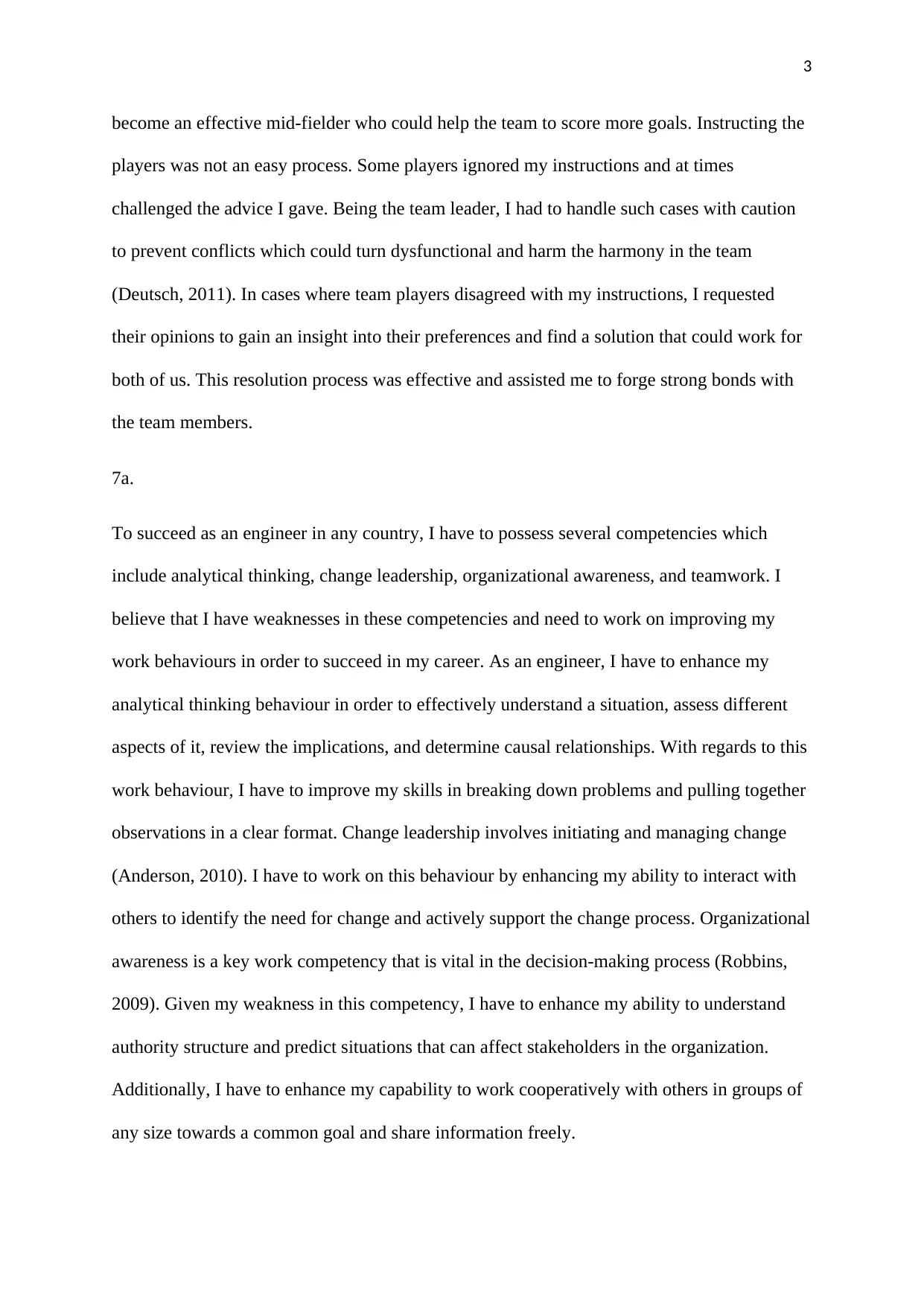
3
become an effective mid-fielder who could help the team to score more goals. Instructing the
players was not an easy process. Some players ignored my instructions and at times
challenged the advice I gave. Being the team leader, I had to handle such cases with caution
to prevent conflicts which could turn dysfunctional and harm the harmony in the team
(Deutsch, 2011). In cases where team players disagreed with my instructions, I requested
their opinions to gain an insight into their preferences and find a solution that could work for
both of us. This resolution process was effective and assisted me to forge strong bonds with
the team members.
7a.
To succeed as an engineer in any country, I have to possess several competencies which
include analytical thinking, change leadership, organizational awareness, and teamwork. I
believe that I have weaknesses in these competencies and need to work on improving my
work behaviours in order to succeed in my career. As an engineer, I have to enhance my
analytical thinking behaviour in order to effectively understand a situation, assess different
aspects of it, review the implications, and determine causal relationships. With regards to this
work behaviour, I have to improve my skills in breaking down problems and pulling together
observations in a clear format. Change leadership involves initiating and managing change
(Anderson, 2010). I have to work on this behaviour by enhancing my ability to interact with
others to identify the need for change and actively support the change process. Organizational
awareness is a key work competency that is vital in the decision-making process (Robbins,
2009). Given my weakness in this competency, I have to enhance my ability to understand
authority structure and predict situations that can affect stakeholders in the organization.
Additionally, I have to enhance my capability to work cooperatively with others in groups of
any size towards a common goal and share information freely.
become an effective mid-fielder who could help the team to score more goals. Instructing the
players was not an easy process. Some players ignored my instructions and at times
challenged the advice I gave. Being the team leader, I had to handle such cases with caution
to prevent conflicts which could turn dysfunctional and harm the harmony in the team
(Deutsch, 2011). In cases where team players disagreed with my instructions, I requested
their opinions to gain an insight into their preferences and find a solution that could work for
both of us. This resolution process was effective and assisted me to forge strong bonds with
the team members.
7a.
To succeed as an engineer in any country, I have to possess several competencies which
include analytical thinking, change leadership, organizational awareness, and teamwork. I
believe that I have weaknesses in these competencies and need to work on improving my
work behaviours in order to succeed in my career. As an engineer, I have to enhance my
analytical thinking behaviour in order to effectively understand a situation, assess different
aspects of it, review the implications, and determine causal relationships. With regards to this
work behaviour, I have to improve my skills in breaking down problems and pulling together
observations in a clear format. Change leadership involves initiating and managing change
(Anderson, 2010). I have to work on this behaviour by enhancing my ability to interact with
others to identify the need for change and actively support the change process. Organizational
awareness is a key work competency that is vital in the decision-making process (Robbins,
2009). Given my weakness in this competency, I have to enhance my ability to understand
authority structure and predict situations that can affect stakeholders in the organization.
Additionally, I have to enhance my capability to work cooperatively with others in groups of
any size towards a common goal and share information freely.
⊘ This is a preview!⊘
Do you want full access?
Subscribe today to unlock all pages.

Trusted by 1+ million students worldwide
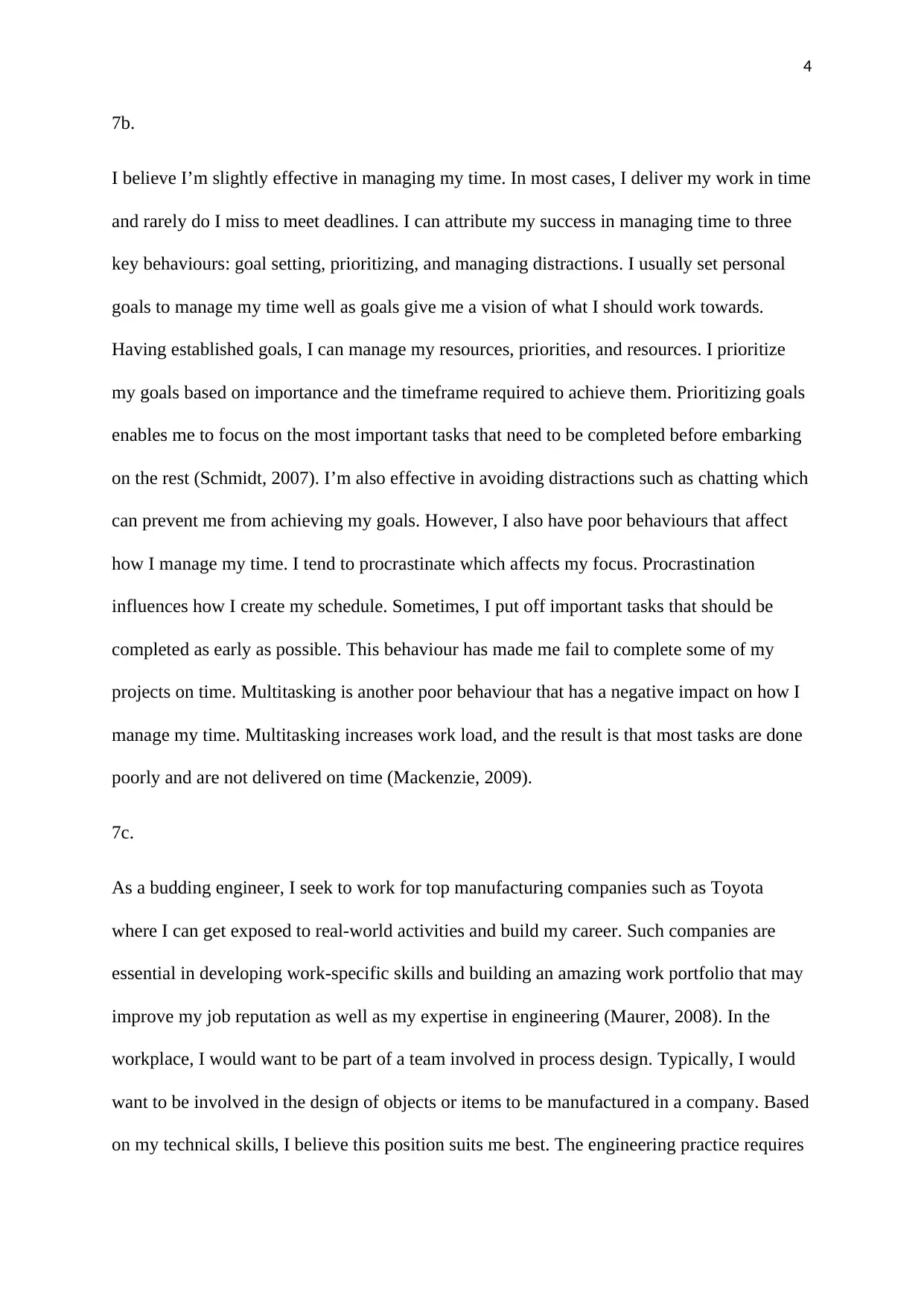
4
7b.
I believe I’m slightly effective in managing my time. In most cases, I deliver my work in time
and rarely do I miss to meet deadlines. I can attribute my success in managing time to three
key behaviours: goal setting, prioritizing, and managing distractions. I usually set personal
goals to manage my time well as goals give me a vision of what I should work towards.
Having established goals, I can manage my resources, priorities, and resources. I prioritize
my goals based on importance and the timeframe required to achieve them. Prioritizing goals
enables me to focus on the most important tasks that need to be completed before embarking
on the rest (Schmidt, 2007). I’m also effective in avoiding distractions such as chatting which
can prevent me from achieving my goals. However, I also have poor behaviours that affect
how I manage my time. I tend to procrastinate which affects my focus. Procrastination
influences how I create my schedule. Sometimes, I put off important tasks that should be
completed as early as possible. This behaviour has made me fail to complete some of my
projects on time. Multitasking is another poor behaviour that has a negative impact on how I
manage my time. Multitasking increases work load, and the result is that most tasks are done
poorly and are not delivered on time (Mackenzie, 2009).
7c.
As a budding engineer, I seek to work for top manufacturing companies such as Toyota
where I can get exposed to real-world activities and build my career. Such companies are
essential in developing work-specific skills and building an amazing work portfolio that may
improve my job reputation as well as my expertise in engineering (Maurer, 2008). In the
workplace, I would want to be part of a team involved in process design. Typically, I would
want to be involved in the design of objects or items to be manufactured in a company. Based
on my technical skills, I believe this position suits me best. The engineering practice requires
7b.
I believe I’m slightly effective in managing my time. In most cases, I deliver my work in time
and rarely do I miss to meet deadlines. I can attribute my success in managing time to three
key behaviours: goal setting, prioritizing, and managing distractions. I usually set personal
goals to manage my time well as goals give me a vision of what I should work towards.
Having established goals, I can manage my resources, priorities, and resources. I prioritize
my goals based on importance and the timeframe required to achieve them. Prioritizing goals
enables me to focus on the most important tasks that need to be completed before embarking
on the rest (Schmidt, 2007). I’m also effective in avoiding distractions such as chatting which
can prevent me from achieving my goals. However, I also have poor behaviours that affect
how I manage my time. I tend to procrastinate which affects my focus. Procrastination
influences how I create my schedule. Sometimes, I put off important tasks that should be
completed as early as possible. This behaviour has made me fail to complete some of my
projects on time. Multitasking is another poor behaviour that has a negative impact on how I
manage my time. Multitasking increases work load, and the result is that most tasks are done
poorly and are not delivered on time (Mackenzie, 2009).
7c.
As a budding engineer, I seek to work for top manufacturing companies such as Toyota
where I can get exposed to real-world activities and build my career. Such companies are
essential in developing work-specific skills and building an amazing work portfolio that may
improve my job reputation as well as my expertise in engineering (Maurer, 2008). In the
workplace, I would want to be part of a team involved in process design. Typically, I would
want to be involved in the design of objects or items to be manufactured in a company. Based
on my technical skills, I believe this position suits me best. The engineering practice requires
Paraphrase This Document
Need a fresh take? Get an instant paraphrase of this document with our AI Paraphraser
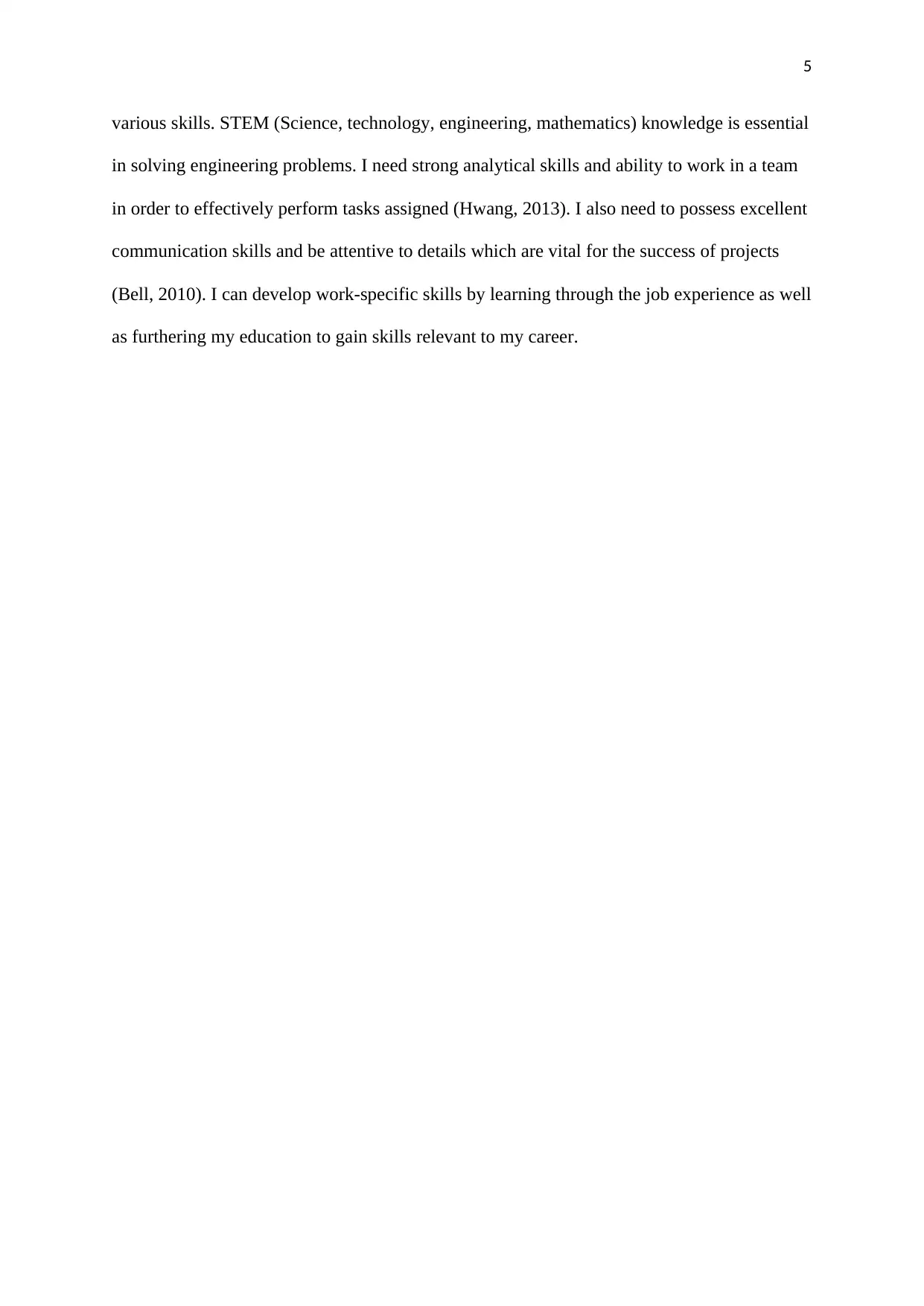
5
various skills. STEM (Science, technology, engineering, mathematics) knowledge is essential
in solving engineering problems. I need strong analytical skills and ability to work in a team
in order to effectively perform tasks assigned (Hwang, 2013). I also need to possess excellent
communication skills and be attentive to details which are vital for the success of projects
(Bell, 2010). I can develop work-specific skills by learning through the job experience as well
as furthering my education to gain skills relevant to my career.
various skills. STEM (Science, technology, engineering, mathematics) knowledge is essential
in solving engineering problems. I need strong analytical skills and ability to work in a team
in order to effectively perform tasks assigned (Hwang, 2013). I also need to possess excellent
communication skills and be attentive to details which are vital for the success of projects
(Bell, 2010). I can develop work-specific skills by learning through the job experience as well
as furthering my education to gain skills relevant to my career.
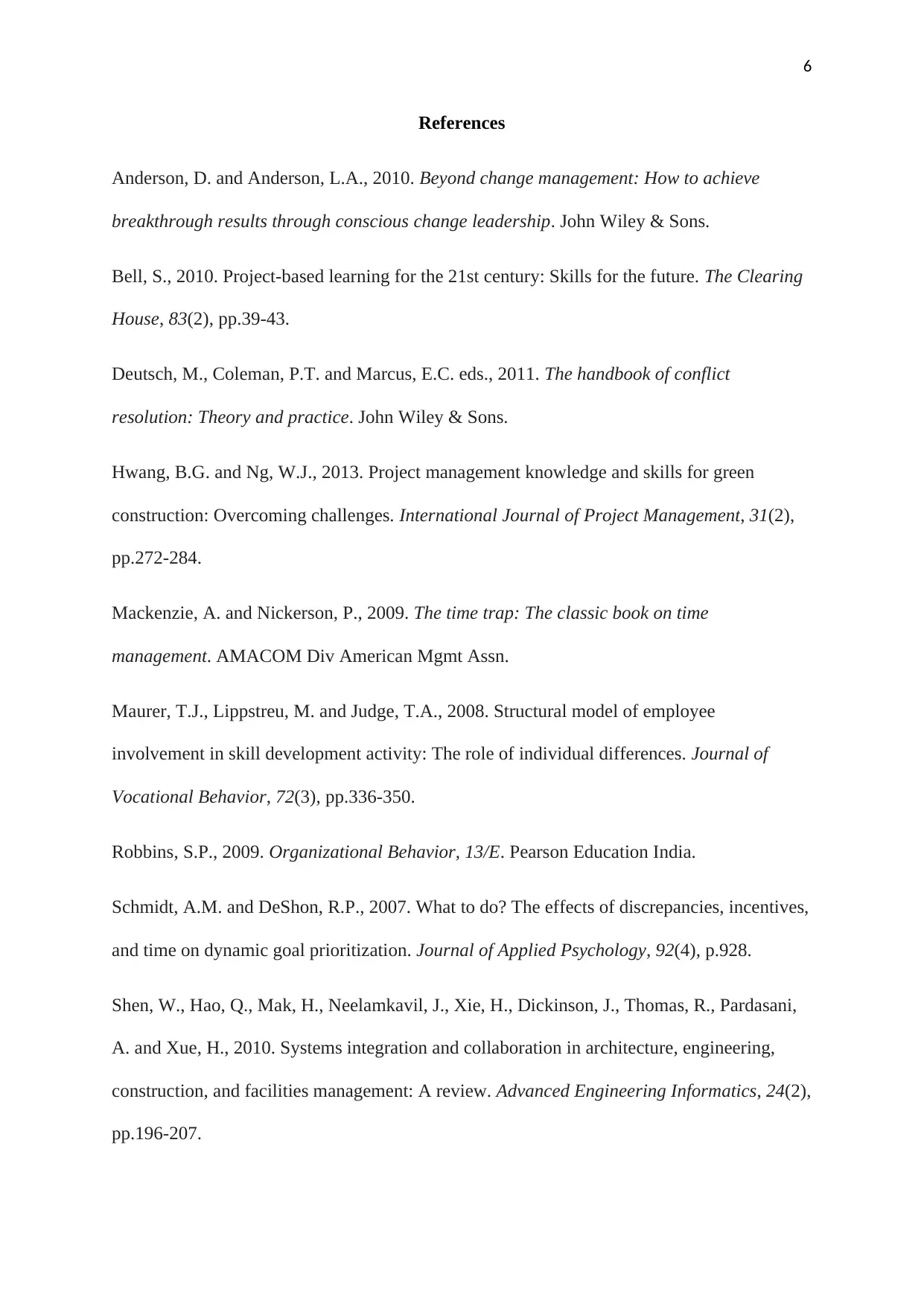
6
References
Anderson, D. and Anderson, L.A., 2010. Beyond change management: How to achieve
breakthrough results through conscious change leadership. John Wiley & Sons.
Bell, S., 2010. Project-based learning for the 21st century: Skills for the future. The Clearing
House, 83(2), pp.39-43.
Deutsch, M., Coleman, P.T. and Marcus, E.C. eds., 2011. The handbook of conflict
resolution: Theory and practice. John Wiley & Sons.
Hwang, B.G. and Ng, W.J., 2013. Project management knowledge and skills for green
construction: Overcoming challenges. International Journal of Project Management, 31(2),
pp.272-284.
Mackenzie, A. and Nickerson, P., 2009. The time trap: The classic book on time
management. AMACOM Div American Mgmt Assn.
Maurer, T.J., Lippstreu, M. and Judge, T.A., 2008. Structural model of employee
involvement in skill development activity: The role of individual differences. Journal of
Vocational Behavior, 72(3), pp.336-350.
Robbins, S.P., 2009. Organizational Behavior, 13/E. Pearson Education India.
Schmidt, A.M. and DeShon, R.P., 2007. What to do? The effects of discrepancies, incentives,
and time on dynamic goal prioritization. Journal of Applied Psychology, 92(4), p.928.
Shen, W., Hao, Q., Mak, H., Neelamkavil, J., Xie, H., Dickinson, J., Thomas, R., Pardasani,
A. and Xue, H., 2010. Systems integration and collaboration in architecture, engineering,
construction, and facilities management: A review. Advanced Engineering Informatics, 24(2),
pp.196-207.
References
Anderson, D. and Anderson, L.A., 2010. Beyond change management: How to achieve
breakthrough results through conscious change leadership. John Wiley & Sons.
Bell, S., 2010. Project-based learning for the 21st century: Skills for the future. The Clearing
House, 83(2), pp.39-43.
Deutsch, M., Coleman, P.T. and Marcus, E.C. eds., 2011. The handbook of conflict
resolution: Theory and practice. John Wiley & Sons.
Hwang, B.G. and Ng, W.J., 2013. Project management knowledge and skills for green
construction: Overcoming challenges. International Journal of Project Management, 31(2),
pp.272-284.
Mackenzie, A. and Nickerson, P., 2009. The time trap: The classic book on time
management. AMACOM Div American Mgmt Assn.
Maurer, T.J., Lippstreu, M. and Judge, T.A., 2008. Structural model of employee
involvement in skill development activity: The role of individual differences. Journal of
Vocational Behavior, 72(3), pp.336-350.
Robbins, S.P., 2009. Organizational Behavior, 13/E. Pearson Education India.
Schmidt, A.M. and DeShon, R.P., 2007. What to do? The effects of discrepancies, incentives,
and time on dynamic goal prioritization. Journal of Applied Psychology, 92(4), p.928.
Shen, W., Hao, Q., Mak, H., Neelamkavil, J., Xie, H., Dickinson, J., Thomas, R., Pardasani,
A. and Xue, H., 2010. Systems integration and collaboration in architecture, engineering,
construction, and facilities management: A review. Advanced Engineering Informatics, 24(2),
pp.196-207.
⊘ This is a preview!⊘
Do you want full access?
Subscribe today to unlock all pages.

Trusted by 1+ million students worldwide
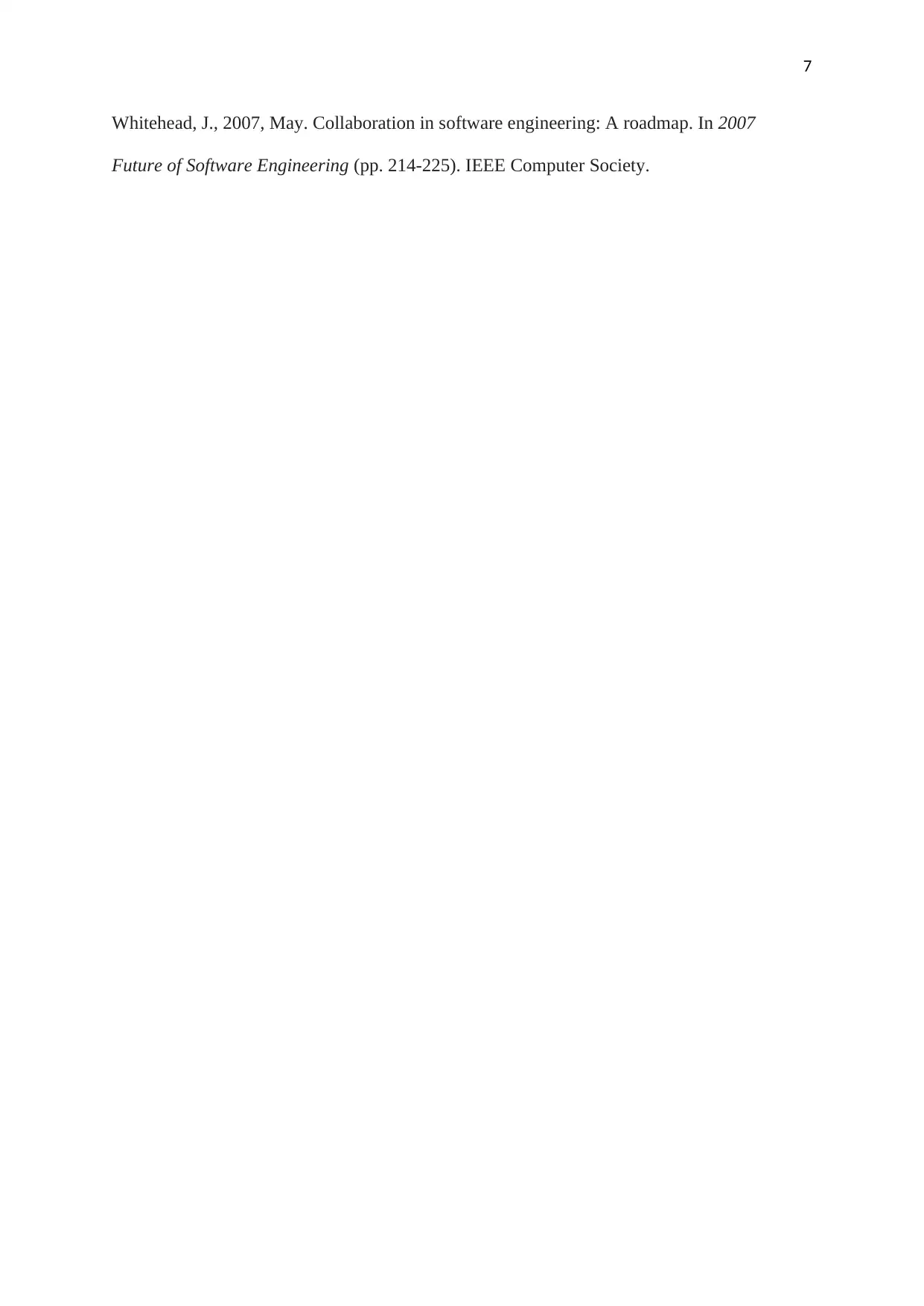
7
Whitehead, J., 2007, May. Collaboration in software engineering: A roadmap. In 2007
Future of Software Engineering (pp. 214-225). IEEE Computer Society.
Whitehead, J., 2007, May. Collaboration in software engineering: A roadmap. In 2007
Future of Software Engineering (pp. 214-225). IEEE Computer Society.
1 out of 7
Related Documents
Your All-in-One AI-Powered Toolkit for Academic Success.
+13062052269
info@desklib.com
Available 24*7 on WhatsApp / Email
![[object Object]](/_next/static/media/star-bottom.7253800d.svg)
Unlock your academic potential
Copyright © 2020–2026 A2Z Services. All Rights Reserved. Developed and managed by ZUCOL.





